Theater Feature: Best Stage Productions of 2015
Fuse theater critics pick some of the outstanding productions of the year.
By The Arts Fuse Staff
Arts Fuse stage critics have come up with some standout productions. Feel free to write in and tell us about your favorites — and why they were so good.
Bill Marx
Editor
The Arts Fuse
Here are my five choices of the best shows that sparkled brightest on Boston-area stages:
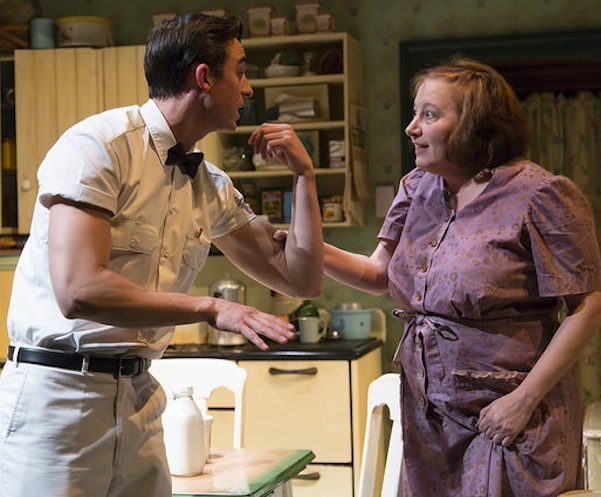
Michael Knowlton and Adrianne Krstansky in the Huntington Theatre Company’s production of “Come Back, Little Sheba.” Photo: T. Charles Erickson.
* Come Back, Little Sheba, by William Inge, directed by David Cromer, Huntington Theatre Company.
Inge’s first full-length play premiered on Broadway in 1950, and its provocative themes — repressed vs. overt sexuality, substance abuse vs. intervention, fulfillment vs. dashed hopes — resonate just as strongly today. HTC’s superb production featured vivid, heartbreaking, and triumphant performances by Adrienne Krstansky as Lola and Derek Hasenstab as Doc, a hapless couple whose lives came undone before our eyes.
* Needles and Opium, written and directed by Robert Lepage, ArtsEmerson.
Quebec City-based Robert Lepage is a master of using special effects to enhance his powerful storytelling. These include puppetry, slack wire acrobatics, dance, computer-generated lighting, and music. Needles and Opium abounded in theatrical wizardry. It took us on an intergalactic flight, serving up a savory feast of aural and visual experiences that stirred our minds and enriched our spirits.
* Muse and Morros, Culture Clash’s 30th Anniversary Tour, created, written, and performed by Richard Montoya, Ric Salinas, and Herbert Siguenza, ArtsEmerson.
When they returned to Boston in 2015, Los Angeles-based Culture Clash had not performed here in over a decade. It was easy to see why they had not been back: their ballsy brand of political theatre is raunchy rather than polite. The material from this show was drawn from unexpurgated street interviews: a Pakistani cab driver, a Vietnamese gangbanger, a handicapped war veteran, and other displaced Americans struggling for dignity in our fractured nation. Culture Clash delivered gutsy, assaultive performances.
* appropriate, by Branden Jacobs-Jenkins, directed by M. Bevin O’Gara, SpeakEasy Stage Company.
Playwright Jacobs-Jenkins is young, gifted, and black. He pilfered ideas from several writers (Tennessee Williams, Sam Shepard, among others) to cobble together a dark comedy about a white family confronting their racist heritage in a house in the Deep South. His literary thievery paid off: SpeakEasy’s cast – headed by an impressive Melinda Lopez – was riveting.
* Gloucester Blue, written and directed by Israel Horovitz, Gloucester Stage Company.
Yes, Horovitz is into recycling: a conflict between hard-bitten workers and wealthy WASP landowners in a rapidly gentrified Gloucester, MA can be found in his earlier plays, such as North Shore Fish and Sins of the Mother. Still, Gloucester Blue — featuring Robert Walsh and Esme Allen as fired-up combatants Latham and Lexi — emerged as a well-acted, forceful variation on the theme, particularly given that this time around the material came spiked with deviously playful black humor.
— Bob Israel
Robert Israel writes about theater, travel, and the arts, and is a member of Independent Reviewers of New England (IRNE). He can be reached at risrael_97@yahoo.com.
Any “best-of” list is going to be idiosyncratic –- it is as much a reflection of what the critic had time to see as it is of the critic’s tastes. It is entirely possible that I did not see something that I would have loved.
Boston boasts a lot of theatrical talent. But this gathering is not a compendium of “the good.” The productions are on this list because they transcended expectations: they had that alchemy that happens when every element (acting, directing, costuming, script, etc) combines into something greater.
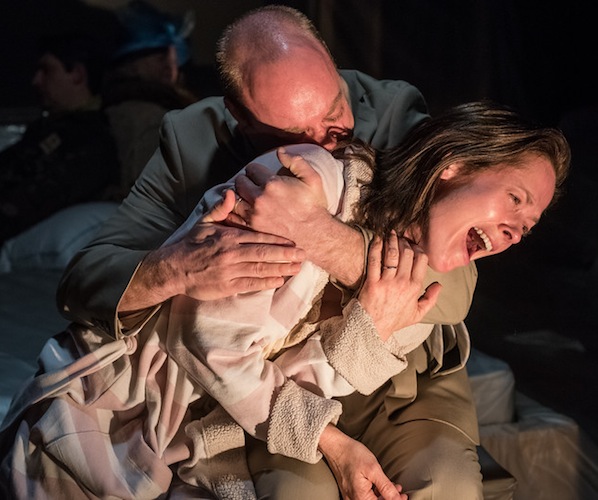
An agonizing moment between Mel (Tamara Hickey) and Ted (Gabriel Kuttner) in the Actors’ Shakespeare Project’s production of “God’s Ear.” Photo: Stratton McCrady Photography.
* God’s Ear by Jenny Schwartz. Directed by Thomas Derrah. Presented by Actors’ Shakespeare Project
Actor’s Shakespeare Project has had a remarkable 2015 (if I were making a list of honorable mentions, they’d rate at least a couple of entries). But who would have expected that the group’s most notable production would not be a play penned by their august namesake, but a contemporary work? Jenny Schwartz’s poetic script revolves around a family mourning the accidental death of a child. It addresses language’s inability to adequately express grief. The mother, father, and sister grieve alone and also in the company of barflies, a “transvestite air stewardess,” the tooth fairy, and a GI Joe action figure. It is not surprising that the superb actor Thomas Derrah would be able to draw out excellent performances from his cast. What was striking is that Derrah was also visually and choreographically inventive. Edward Young’s musical settings for Schwartz’s lyrics turned out to be the kind of top-notch avant-pop that I’d love to hear again and again.
* Ulysses On Bottles by Gilad Evron. Translated by Evan Fallenberg. Directed by Guy Ben-Aharon. Presented by Israeli Stage and Arts Emerson
Israeli Stage has mostly focused on staged readings, which is how I first encountered Gilad Evron’s play in 2012. I was particularly pleased when artistic director Guy Ben-Aharon announced this would be their first full production, a decision I’d like to think my lobbying influenced. Ulysses is an Arab-Israeli citizen and former literature teacher who is arrested trying to sail to Gaza on a raft of his own devising. He has been possessed by the quixotic notion that the spiritual emptiness of the Palestinians can only be filled by an encounter with classic Russian literature. This absurd act is the inspiration for a profound political tragedy: Ulysses’ attorney, even as he fights to gain his client’s release, knows that granting Ulysses the freedom to pursue his quest may lead to his death. Ulysses’ story overlaps with the quandary of a member of Israel’s security establishment, who realizes that no matter how well he ensures that the blockade of Hamas-ruled Gaza accords with international humanitarian law, peace and security will remain an illusion. Ben-Aharon opted for a minimalist production; he put his efforts into putting across the script’s language and the performances of his all-star cast. This is the best kind of political drama: audiences across the ideological spectrum will find something here that might antagonize them or force them to question their beliefs.
* The Whole World by Theresia Walser and Karl-Heinz Ott. Translated by Ingrid MacGillis. Staged reading directed by Guy Ben-Aharon. Presented by German Stage at the Goethe-Instititut Boston.
As much as I love a good comedy, I rarely laugh in my role as a reviewer. Yet watching this staged reading I caught myself cackling, chortling, and giggling at this four hander about a bored, childless couple who lure the downstairs neighbors into their lair in order to regale them with tales about their fascinating bohemian pursuits. Then they decide to scandalize the visitors with a verbal assault on every platitude that buoys bourgeois normality. Theresia Walser has already won favor with this critic as a wicked political satirist, but when she collaborates with her husband, the playwright, novelist, and essayist Karl-Heinz Ott, the result is a devilishly comic machine that picks apart nearly every taboo that allows modern society to function.
* Albatross by Matthew Spangler and Benjamin Evett. Directed by Rick Lombardo. Presented by The Poets’ Theatre.
Samuel Taylor Coleridge’s Rime of the Ancient Mariner is the inspiration for this solo show, but co-writers Matthew Spangler and Benjamin Evett so greatly expanded the world and character of the poem’s unnamed narrator that it’s hardly fair to call this theater piece an adaptation. Given the linguistically rich text, Evett’s virtuoso performance, and the magic director Rick Lombardo’s worked with the myriad design elements, there was no question when I saw Albatross at the Paramount Center in January that it would make my best list for the year. The production was restaged in May at New Rep.
* Dying City by Christopher Shinn. Directed by Cameron Cronin. Staged by the Happy Medium Theatre
It’s no secret that I am not a fan of the current fashion for the two-handers presented in a naturalistic style. Yes, the budget is low; but economic limitations often translate into imaginative limitations. However, in rare instances, dramatists make brilliant use of these constraints. Christopher Shinn’s play isn’t just a yarn about the widow of a U.S. Army reserve officer in Iraq and his twin brother mourning the solider’s death. It is a psychologically complex battle among three cagey individuals: an actor, a psychotherapist, and a doctoral candidate in literature. The trio are constantly strategizing about how to uncover truths that the others are hiding; at the same time it also addresses America’s continuing ambivalence towards the Iraq War.
After the unanticipated closing of the South End’s Factory Theater in late 2014, a number of Boston’s fringe companies, who had already scheduled performances in the space, were left in the lurch. Some canceled their shows, others scrambled to find a new space. Luckily, Happy Medium Theatre was determined, and staged this intense drama in the intimate environment of the kitchen and living room of actors Kiki Samko and Michael Underwood’s Jamaica Plain apartment.
* Once a Blue Moon (Cada Luna Azul) Conceived by Stacy Klein with Carlos Uriona & Matthew Glassman. Devised by the Double Edge Theatre Ensemble. Text by Matthew Glassman and Jennifer Johnson. Directed by Stacy Klein. Presented by Double Edge Theatre in association with Charlestown Working Theater.
Double Edge Theatre Ensemble has evolved such an expansive vision of theater that this show filled the hefty tract of farmland where they reside (and perform) in Ashfield, MA. This past summer the company transformed the farm into a South American town on the verge of being changed beyond recognition by a dam construction project. The town of Agua Santa is populated by a cast of eccentric characters, some clever, some misguided, some foolish, some ribald, and some morbid. A visit to the hamlet yielded philosophical and political mediations on being and becoming, individuality and community. Overshadowing the pastoral/speculative dramatics was the relentless intrusion of modernity and capital. The acting ensemble and the corps of designers created a magical realist spectacle that dazzled the senses without ever lapsing into the superficial. Director Stacy Klein masterfully orchestrated every sound and movement. Those who missed Once a Blue Moon will have an opportunity to see it when Double Edge remounts the production this summer. There is talk that the company may create a touring version of the show that can be presented in conventional theater spaces. My advice: see it in their home environment.
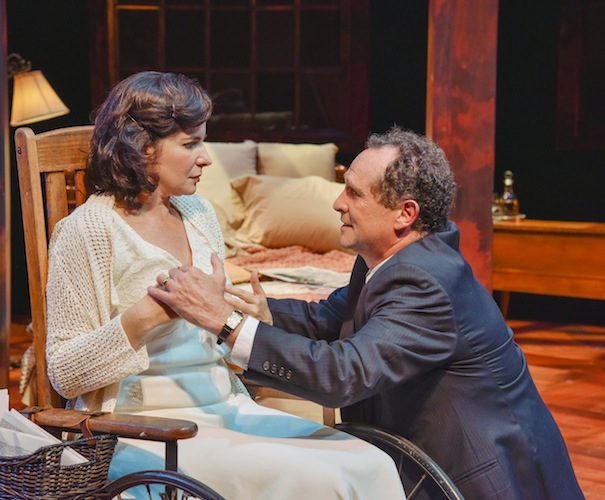
Anne Gottlieb and Jeremiah Kissel in the New Rep production of “Broken Glass.” Photo: Andrew Brilliant / Brilliant Pictures.
* Broken Glass by Arthur Miller. Directed by Jim Petosa. Presented by New Repertory Theatre
New Rep had a fairly uneven 2015, but celebrating the centenary of dramatist Arthur Miller inspired a marvelous production of Broken Glass, Miller’s largely neglected late-career play (it was a Boston-area premiere). This Jim Petosa-helmed production had a great cast and fine design sensibilities. Miller’s historical drama explores how the 1938 Kristallnacht pogroms in Germany exerted a profound psychological impact on American Jews living in Brooklyn. The 1994 script is relevant, and not just because of the persistence of anti-Semitism. Genocide and ethnic cleansing are still going on today — as they were when this play premiered. Productions of engaged dramas like this suggest that theater can play a vital role in American cultural discourse – as it does in other countries.
— Ian Thal
Ian Thal is a playwright, performer, and theater educator specializing in mime, commedia dell’arte, and puppetry, and has been known to act on Boston area stages from time to time, sometimes with Teatro delle Maschere. He has performed his one-man show, Arlecchino Am Ravenous, in numerous venues in Massachusetts and Rhode Island. One of his as-of-yet unproduced full-length plays was picketed by a Hamas supporter during a staged reading. He is looking for a home for his latest play, The Conversos of Venice, which is a thematic deconstruction of Shakespeare’s The Merchant of Venice. Formerly the community editor at The Jewish Advocate, he blogs irregularly at the unimaginatively entitled The Journals of Ian Thal, and writes the “Nothing But Trouble” column for The Clyde Fitch Report.
Because I am teaching full-time and editing The Arts Fuse, I can’t see as much theater as I would like. I agree with Bob Israel’s choices of Come Back Little Sheba (Huntington Theatre Company), Needles and Opium (Robert Lepage), and appropriate (SpeakEasy Stage Company). I very much share Ian’s admiration for God’s Ear (Actors’ Shakespeare Project) and Albatross (The Poets’ Theatre).
Here are a few other favorites, with a book tossed in out of polemical orneriness.
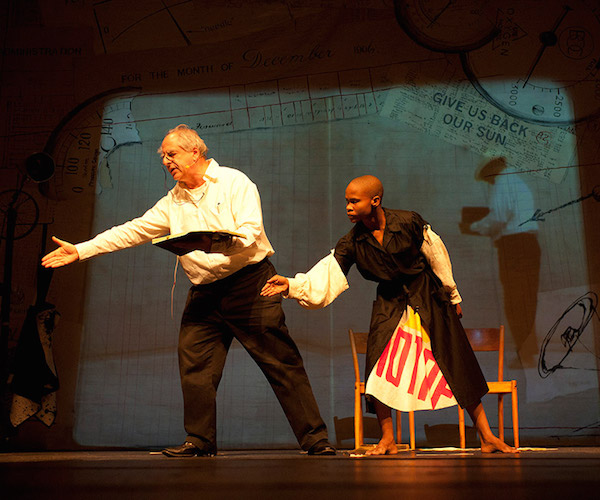
Artist William Kentridge and a fellow performer in “Refuse the Hour.” Photo: John Hodgkiss.
* Refuse the Hour, conception and libretto by William Kentridge. Music by Philip Miller. My favorite production of the year (it came, briefly, to Yale Repertory Theatre), a Dadaesque hodge-podge in which a brilliant contemporary artist examines the nature of time, personal and historical, through a surreal blend of music, mind-bending imagery, and philosophical speculation. It was messy, inscrutable, surprising, and Way Out There — just where theater is too timid/commercial to go nowadays.
* Beckett Women: Ceremonies of Departure, directed by Robert Scanlan (The Poets’ Theatre). An evening made up of four powerful pieces (Not I, Rockabye, Footfalls, Come and Go) that focused on female voices bidding the world adieu. For some reason, Scanlan minimized the possibilities for humor in the material, but this was a beautifully acted excursion into absurdity that tapped into Beckett’s agonizing lyricism.
* Betty Bam!: The Daniil Kharms Project Two by Daniil Kharms. Directed by Matthew Woods, Joey C. Pelletier, and Michael Underhill. (imaginary beasts)
imaginary beasts’ production of this indescribable voyage into nonsense was unnecessarily lumpy, but once you figured out what Kharms is up to, this was a delightfully satiric excursion into genre meltdown. He generates uncertainty by twisting literary conventions to the breaking point and then some. The fun comes from the playwright’s determination never to be pinned down — he serves up who-knows-what with whiz bang purity.
* The Caucasian Chalk Circle by Bertolt Brecht. Translated by James and Tania Stern, with W.H. Auden. Directed by Liz Diamond. (Yale Repertory Theatre)
Those who wanted to experience the brilliance of Bertolt Brecht at its mellowest should have headed down to Yale Rep’s lively and moving production. Staged with immediacy and vaudevillian savoir faire by Liz Diamond, the production gave us the dramatist/poet at his most “bourgeois,” in the sense that in this script he celebrates the bonds of maternal love (and its fragile protectors) amid a chaotic vision of warfare, barbarity, and death: workers and soldiers are butchering each other, double-dealing is the “ethical” norm, and various tyrants, great and small, are popping in and out of power. Brecht’s drama points out, with impish irony, that with confusion comes the possibility of justice. Once authoritarian and corporate systems comfortably assert their iron grip, those with power and money call the shots without any muss or fuss.
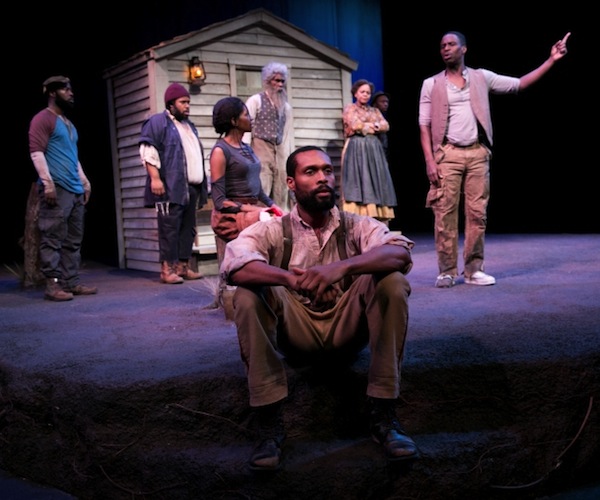
Benton Greene (Hero) in the foreground during a scene in “Part 1: A Measure of a Man.” Photo: Evgenia Eliseeva.
* Father Comes Home From the Wars (Parts 1, 2 & 3) by Suzan-Lori Parks. Directed by Jo Bonney. (American Repertory Theater)
In this American Repertory Theater production there were no jugglers, fire-eaters, or prestidigitators in sight and Cirque du Soleil would have a hell of a time wedging acrobats and flying clowns into a Civil War era drama. This time around we were, thankfully, given skilled actors engaged in a dramatic conflict with their feet on the ground, speaking lines that, on occasion, dazzle. Now that is my kind of magic. Father Comes Home from the Wars … trains a refreshingly mischievous and ironic eye on the ever-shifting nature of Hero and anti-Hero, as well as the poignant tensions between freedom and loyalty.
* A Crack in the Blue Wall by Jacqui Parker. Directed by Parker at Hibernian Hall. I admire Parker’s courage — she takes on a hot-button issue and sets it in our own backyard. A white policeman in Boston shoots a young black man. The family that must deal with the terrible loss is wealthy and the victim’s father is a respected cop: so much for Cable TV and current ‘theater of empowerment’ cliches. Parker wants to register the pain and complexity of the tragedy, not score reassuring political points. I only saw a staged reading of this script, but it had the makings of an insightful and compelling drama.
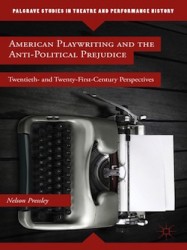
* American Playwriting and the Anti-Political Prejudice: Twentieth and Twenty-first Century Perspectives by Nelson Pressley. Ok — what’s this doing here? I wanted to plug a book that serious theater artists should read and discuss. But it is being ignored because it disturbs the escapist status quo. The volume was published at the end of last year — I didn’t read it until 2015. Pressley, a theater critic for the Washington Post, poses a crucial question. Why, in the face of current political/social problems — from income inequality and climate change to ideological stalemate — do our stages stand quiescent, usually approaching these issues by way of re-packaged boomer nostalgia? His genially rabble rousing argument critiques the trend among theaters to play it safe by choosing stage works that emphasize social uplift (“always leave them inspired”) rather than those that provoke and disturb.
— Bill Marx
Bill Marx is the Editor-in-Chief of The Arts Fuse. For over three decades, he has written about arts and culture for print, broadcast, and online. He has regularly reviewed theater for National Public Radio Station WBUR and The Boston Globe. He created and edited WBUR Online Arts, a cultural webzine that in 2004 won an Online Journalism Award for Specialty Journalism. In 2007 he created The Arts Fuse, an online magazine dedicated to covering arts and culture in Boston and throughout New England.
My theater “beat” is musicals, and Boston stages gave us some excellent ones this year.
We also got some good news for Sondheim lovers: the Lyric Stage Company, which staged terrific productions of Sweeney Todd and Into the Woods in 2014, announced a five-year program that will feature new productions of Sondheim shows, along with workshops and master classes. Led by company director Spiro Veloudos, the project kicks off with Sondheim on Sondheim in spring 2016. And if that’s not enough Sondheim for you, Huntington Theatre Company artistic director Peter DuBois announced his company’s Sondheim initiative, which will stage 15 of the master composer/lyricist’s shows over a number of years. Doubtless this will mean that Boston audiences will get to see some rarely produced Sondheim, in addition to the usual suspects.
Herewith the shows that stirred, delighted, dazzled, and made me laugh.
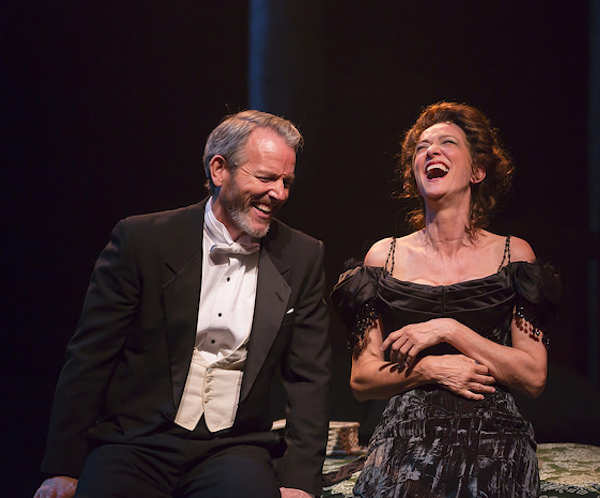
Stephen Bogardus as Fredrik Egerman and Haydn Gwynne as Desirée Armfeldt in the Huntington Theatre Company production of “A Little Night Music.” Photo by T. Charles Erickson.
* A Little Night Music. Music and lyrics by Stephen Sondheim. Book by Hugh Wheeler. Directed by Peter DuBois. Staged by Huntington Theatre Company.
The highlight of the year’s musical offerings was this beautifully designed, sung, and acted production of Sondheim and Wheeler’s reimagining of Ingmar Bergman’s film, Smiles of a Summer Night. Peter DuBois’s direction hit all the right notes of nostalgia, romance, and comedy in this songfest of lush music and ingenious lyrics that tells the story of mismatched lovers, sex, self-delusion, and theater itself. A few performances stood out among the generally terrific cast: Boston stage veteran Bobbie Steinbach was wry and touching as Mme. Armfeldt; Lauren Molina wrung all the bitterness, hurt, and sarcasm out of her role as the long-suffering Charlotte; and Haydn Gwynne brought a sharp, sexy, world-weariness to Desirée Armfeldt. With gorgeous costumes, imaginative sets, a top-notch orchestra, and fluid choreography that perfectly underscored the shifting alliances of the lovers, the Huntington production could not have been better.
* Waitress. Music and lyrics by Sara Bareilles. Book by Jessie Nelson. Directed by Diane Paulus. Staged by American Repertory Theater.
Jessie Mueller, who won a Tony for her lead performance in Beautiful: The Carole King Musical, starred in this new musical based on the film by the late Adrienne Shelly. Mueller brought warmth, grit, and a stunning voice to the role of Jenna, a diner waitress stuck in a loveless marriage who finds herself pregnant and discovers a way out of her predicament that centers around the making of pies. Nelson’s book is full of sharp comedy, and Bareilles’s first-rate score—her first for a musical—draws on styles including Broadway, country, R&B, and even doo wop, with heartfelt and witty lyrics. Most of the excellent cast will be joining Mueller in New York when Waitress opens in March, following in the by now well-trodden path Paulus has blazed between Cambridge and Broadway.
* Beautiful: The Carole King Musical. Book by Douglas McGrath. Words and music by Gerry Goffin & Carole King and Barry Mann & Cynthia Weil. Director, Mark Bruni. Staged by Broadway in Boston at the Boston Opera House.
In a doubly ironic bit of casting, about a month after the end of Waitress, Jessie Mueller’s older sister came to town as the star of the traveling production of Beautiful. Taking over Jessie’s Tony-winning role, Abby Mueller brought to the production her own down-to-earth charm and a terrific voice. The book is a cut above that of the usual jukebox musical, with plenty of wry humor, as it follows the songwriter from her early rock and roll hits with her husband, lyricist Gerry Goffin, to the debut of her solo megahit album, Tapestry. The show also features the characters and songs of another successful songwriting couple, Barry Mann and Cynthia Weil. The inclusion of these friends (and rivals) of Goffin and King adds to the sense of creative ferment in the New York hit factories of the late ’50s and the ’60s. The excellent leads and ensemble seemed to take as much joy in singing songs like “Will You Love Me Tomorrow,” “So Far Away,” and “You’ve Lost That Lovin’ Feeling” as the audience did in hearing them. No new ground is broken here, but great music, solid acting, and a witty book made for a thoroughly enjoyable evening.
* City of Angels. Music by Cy Coleman and lyrics by David Zippel. Book by Larry Gelbart. Directed by Spiro Veloudos. Staged by The Lyric Stage Company of Boston.
The Lyric Stage did a swell job on this ingeniously structured spin on film noir and 1940s Hollywood. The two-level stage design and lighting (one plot line played out in black-and-white, the other in color) made the complicated story easy to follow and helped us keep track of the nearly 40 characters played by 17 actors. The show’s parallel story lines play out to a jazzy score and a sharp, witty script about a Hollywood hack struggling to write a screenplay, and his creation, an ex-cop turned detective. Standouts included Ed Hoopman as the gumshoe, Stone, and Leigh Barrett, funny and heartbreaking as both his Girl Friday, Oolie, and the studio mogul’s assistant, Donna. Also notable were the excellent six-piece band and the vocal quartet dubbed the Angel City 4, whose close harmonies weave through the action. All in all, a stylish, entertaining production.
— Evelyn Rosenthal
Evelyn Rosenthal is the former editor in chief and head of publications at the Harvard Art Museums. She is also a professional singer, specializing in jazz and Brazilian music. She writes about musical theater, books, and music for The Arts Fuse.
